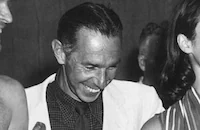With These Hands
Cast & Crew
Jack Arnold
Sam Levene
Arlene Francis
Joseph Wiseman
Louis Sorin
Alexander Scourby
Film Details
Technical Specs

Synopsis
Cloak operator Alexander Brody, having reached the age of sixty-five, applies for retirement benefits at the International Ladies' Garment Workers' Union office. While he waits for his application to be reviewed, he remembers his time with the union: In 1910, the men who work in the sweatshops face fines or dismissal if they do not follow every rule. Angered by the conditions, Alexander quits his job, to the distress of his wife Jenny, and attends a meeting of the Ladies' Garment Workers' union. Soon, 55,000 cloak workers go on strike. For fifty-eight days, the workers man picket lines. Families pawn their jewelry, watches--anything of value--to help finance the strike. After the strike ends, Alexander's shop steward encourages the union members to elect their own politicians and remove the power from the ward heelers. When Alexander witnesses a fixed election, he demands a recount and is beaten for his efforts. Some garment manufacturers fear the union's growing power. In an effort to keep its female shirtwaist workers from talking to union representatives, the Triangle Waist Company locks them inside the factory, and when a fire breaks out, the women are trapped. One hundred forty-six workers die in the fire. Afterward, many new workers join the union. When DeLeo, Alexander's friend and fellow garment worker, contracts tuberculosis, the union's doctor arranges for him to be sent to a sanitorium until he recovers his health. During World War I, Alexander fights in France. After the war, conditions for the workers steadily improve. The Communist party instigates a general strike in 1926 that almost ruins the union. Then in 1929, the stock market crash puts so many people out of work that the union is broken and deeply in debt. In 1933, Franklin D. Roosevelt is elected president and soon establishes the National Recovery Act. DeLeo, now completely recovered, returns and becomes a union organizer. Union membership grows to 250,000. The union and employers negotiate together under a collective bargaining agreement. The union, which now boasts 400,000 members, establishes Unity House in the Poconos Mountains as a vacation spot for its members and offers health care facilities, a retirement fund and death benefits. It takes Alexander only a few minutes to sign his papers and activate his pension payments, the reward for his long years of service as a union member.

Director

Jack Arnold
Cast

Sam Levene

Arlene Francis

Joseph Wiseman
Louis Sorin

Alexander Scourby

Rudy Bond
Alexander Lockwood
Haskell Coffin
Julius Bing
Morris Strassberg
Rolly Bester
Gail Gregg
Judy Walther
Crew

Film Details
Technical Specs

Award Nominations
Best Documentary Feature
Quotes
Trivia
Notes
Before the film's opening credits, the following newspaper headlines are shown: "President [William] Green of the AFL hails ILGWU film. Fiftieth anniversary of union and 100th anniversary of Samuel Gompers' birth-builder of trade movement union in U.S.-came from East side of London." Newsreel footage of events of the time is included in the film. The picture first screened in Atlantic City, NJ, on the 50th anniversary of the ILGWU. According to a April 16, 1950 New York Times article, it was shot at the Fox Movietone studios and at various New York City locations, including Mercer St. and Union headquarters, and at Unity House. The film, which marked the motion picture debut of Alexander Scourby, received an Oscar nomination for Best Documentary and won the Sidney Hillman Award for Best Labor Film and a Freedom Foundation Award.












